
20 minute read
The Right Honourable Lord
Justice Singh
Ob 1981
Advertisement
Sir Rabinder Singh is one of 37 Lord and Lady Justices of Appeal in England and Wales (judges of the Court of Appeal). He is also President of the Investigatory Powers Tribunal and was formerly a High Court judge of the Queen’s Bench Division, a barrister and (at that time) Queen’s Counsel, a founding member of Matrix Chambers, a legal academic and respected author.
He was born in Delhi to a Sikh family and grew up in a working- class part of Bristol while attending BGS as a scholar. From an early age he had an interest in law and went on to earn a double first in law at Trinity College, Cambridge. He became a Harkness Fellow at the University of California at Berkeley and developed an interest in constitutional law, particularly how the law holds those in power to account. Sir Rabinder is one of three Lord Justices of Appeal to have attended BGS.
Can you remember any teachers at BGS who had an impact on you?
David Miller, who was head of classics and taught me the importance of thinking logically (in particular by doing unseen translations). Philip Revill, who was head of history and taught me the importance of ideas.
Why did you choose law?
I thought that law would be a useful way to help people, in particular those who are among the less fortunate in society.
Could you have chosen another path and what might that have been?
I think I might have become an academic, perhaps specialising in Greek tragedy, but I don’t think I would have been very good, so I am glad I fell into the law, which happily I was good at.
What were your most cherished experiences of university?
The most important thing was the friends that I made, both at Cambridge and at Berkeley. Some of them came from many different countries around the world. I am still in touch with some of them.
What has been the most significant highlight of your career?
Becoming a High Court judge in 2011. I was the first person of Asian heritage to be appointed to the High Court in this country. In 2017 I became the first person of colour to be appointed to the Court of Appeal. I hope to inspire others, in particular students and young lawyers, to believe that anything is possible for them in this country.
What’s next for you?
I am happy doing what I currently do, so hope to carry on with the interesting and important work of the Court of Appeal and IPT, health permitting.
What motivates you?
To do justice to everyone who comes before our legal system and to treat everyone fairly.
How do you relax?
My wife and I have a very loving and energetic dog, so we keep fit by walking. We also enjoy seeing the great British countryside in our campervan.
What advice would you give to your younger self?
Not to worry because it will work out in the end.
Vadim Jean OB 1982
Award-winning film maker, director and executive producer, Vadim Jean established his own production company in 1989 soon after leaving BGS. He first came to public attention as a director when “Leon the Pig Farmer” won him the FIPRESCI International Critics’ Prize at the 1992 Venice Film Festival, the Best Newcomer award from the London Critics’ Circle, the Most Promising Newcomer at the Evening Standard British Film Awards, and the Chaplin Award for the best first feature from the Edinburgh International Film Festival.
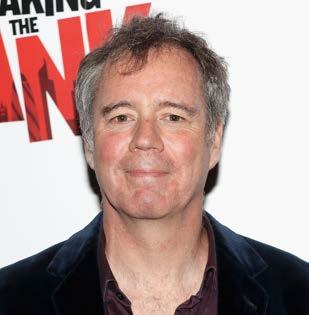
Since then, he earned the reputation as one the leading commercial directors working with top agencies for campaigns including Iceland, Ponds, Volkswagen, Greggs The Bakers, Kodak, Hogfather and the COI. Vadim’s feature documentary In the Land of the Free was critically acclaimed as the ‘Best Documentary of 2010’ by the London Evening Standard.
What are your best memories of BGS?
There are so many, but they would include beating Millfield away at hockey in what would now be year 10. Acting in so many school plays and having the opportunity to try everything I could possibly have wanted to.
Can you remember any teachers at BGS who had an impact on you?
I had many inspiring teachers including my house master Mr Rolling, Mr Revill who inspired me to do a history degree, Bob Shaw who introduced me to my beloved hockey, Roland Clare (who was the first polymath I’d come across) and who made me believe you could be a musician, an actor, make films and invent games all at once. Mr Jackson (whose ‘Arts Miscellany’ class saw me make my first film) who taught me English along with Mr Camp and gave me a love of literature.
Why did you choose film making?
The first film I ever made was an animation of a Kit Kat bar unwrapping itself but that was all at school. Deciding I didn’t want to be an actor at university coincided with watching a lot of films on the big screen at Warwick. I loved the power and visceral emotion of those films and decided I wanted to do something like that but behind the camera. I also (mistakenly) thought that being a film director might make it easier to get a girlfriend...
Could you have chosen another path and what might that have been?
I acted in every school play at BGS and thought I’d end up as an actor but while at university I didn’t get the lead in the first play I auditioned for when at BGS I had always got the main part when teachers just chose the best actor! When it turned out it was because another student who was directing the play had cast himself, I decided right then I wanted to be the one making the decisions behind the camera. So, I suppose it could have been an actor. Now I sneakily wish if I’d been more talented, then I would love to have been a professional sportsman.
What has been the most significant highlight of your career?
The feature documentary
‘Cruel & Unusual’ I made over the course of eight years that helped secure the release of 3 members of the Black Panther Party in America who had been wrongfully incarcerated for over a hundred years between them in solitary confinement in Louisiana. That must rank among the most significant to date. And being the first person to bring Terry Pratchett’s Discworld to life as a live action adaptation and then having my name on the published screenplay next to his (and my name was bigger!).
What has been your most challenging project? Every single one. There’s always a challenge. That’s why it’s rewarding and fun. I love solving problems, especially if by being ingenious you can create something magical without just throwing huge resources at the project.
What’s next for you?
I’m directing the feature documentary about double Olympic champion in the decathlon, Daley Thompson.
What motivates you?
Trying to be the best I can possibly be, whether it’s making a film or playing hockey. I still haven’t won my BAFTA and though I was selected to play for England hockey masters in the indoor World Cup last year, it was cancelled because of COVID; so I’m looking to get those three lions on my chest next year instead!
What advice would you give to your younger self?
Just keep doing what you’re doing because it’s going to turn out pretty well...
Nigel Hall
Ob 1960
Nigel left BGS in 1960 going on to become an internationally respected sculptor and draughtsman with over 100 solo and over 300 group exhibitions around the world. He studied Art at the West of England College and the Royal College of Art before accepting a Harkness Fellowship in California in 1967. A career full of international exhibitions, fellowships and awards, Nigel now resides and works in Balham, London. You can read more about Nigel’s career on his website www.nigelhallartist.com
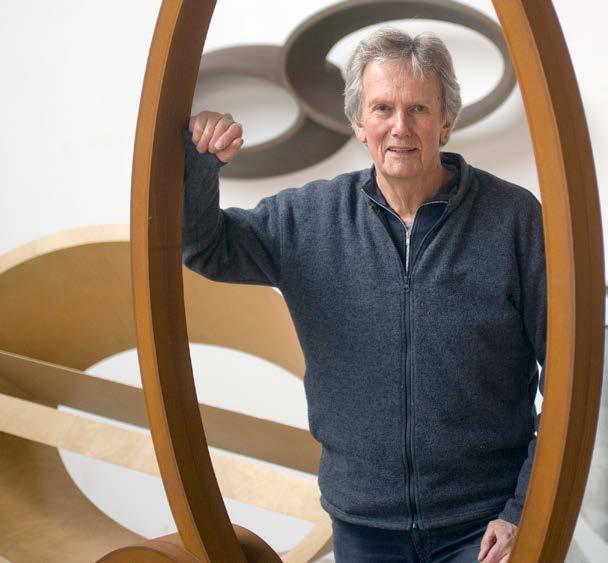
What are your most cherished memories at BGS?
My involvement with the naval cadets and time spent at sea has remained a cherished memory for sixty five years. On one occasion I was instructed to take the helm of a minesweeper on a journey around Lands End. Alone in charge of a naval ship for a couple of hours at the age of sixteen has remained a great early memory. A gratifying discovery were the fives courts, an enjoyable alternative to the rigours of rugby. It might also have contributed to my spatial awareness and fondness for the geometry of angles!
David Rolls
Ob 1998
Can you remember any teachers at BGS who had an impact on you?
Latin master ‘Doc’ Martin was a wonderful, learned and kind man who I remember with affection. Mr. Carter, who I believe taught me in the third form, has a warm place in my memory. He realised I was interested in art and antiquity and out of the blue, gave me a small collection of Greek and Roman coins which I still have today. Eric Dehn taught French and remains strong in my memory. His brother Paul gave me an encouraging review in a school play and suggested I made acting a career, but I chose art school instead. I came very close to making a career in the navy however, my grandfather, a stonemason, shaped my final choice of careers.
What has been the most significant highlight of your career?
Significant highlights would include my retrospective at the Yorkshire Sculpture Park in 2008 as well as gaining a Harkness Fellowship and spending two years working and travelling in the States. Election to the Royal Academy of Art was a great moment, symbolised by the signing of the book and adding one’s name to such a distinguished list of artists dating back more than 250 years. Representing Great Britain at the 1988 Seoul Olympics by making a large sculpture which still stands beside one of the stadiums was an honour.
What has been your most challenging piece?
Last year I made a large steel sculpture for the University of Iowa. Due to its size, 4 × 4 metres, it had to be made in three parts and assembled on site. There were transport problems due to the pandemic and the over-sized nature of the shipment. I oversaw the installation from London using a video call which saved on air miles!
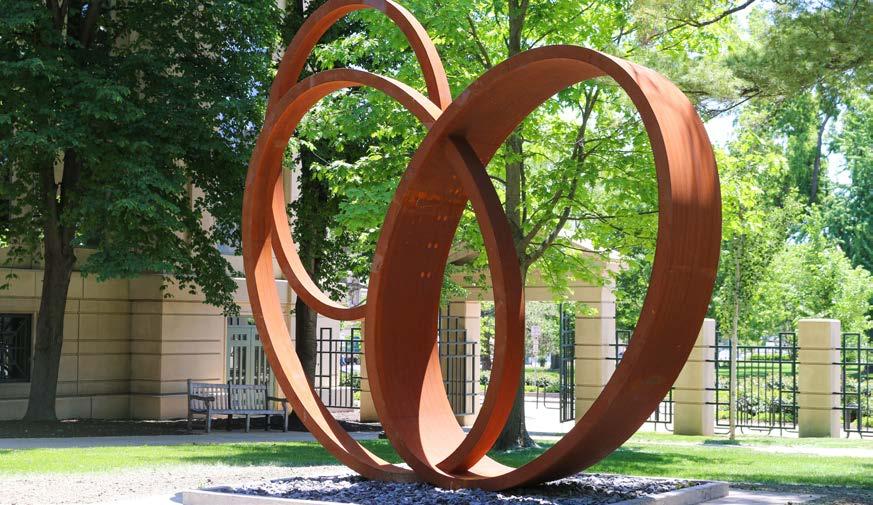
What’s next for you?
2023 will see a few solo exhibitions including a large show in Bad Homburg near Frankfurt for which I’m making new steel sculptures. A second book on my work will be published next year.
What motivates you?
I keep with me at all times, a small sketchbook/notebook in which I make drawings, ideas, lists, anything of note to generate ideas or stimulate new work. This along with reading and listening to music relaxes me and driving has also always been a pleasure. I have driven coast to coast across the USA twice and the length and breadth of Europe several times.
What advice would you give to your younger self?
One – seize every opportunity that presents itself. This I often failed to do. The other, which I did follow was whatever path you choose in life, prepare for the long haul and enjoy it as much as possible – and always retain an optimistic spirit.
Leaving behind his 12-year corporate and investment banking career, David moved to the US in 2015 to study for his MBA at the Massachusetts Institute of Technology (MIT), before embarking on a new technology-focused career. After his MBA, he worked at Amazon’s HQ in Seattle driving new business growth in grocery delivery and financial products, before switching full-time to startups with a focus on democratising finance in e-commerce and global payments.
What are your best memories of BGS? The endless possibilities that seemed within my reach during my time at BGS, a disciplined yet fun environment which suited me really well, and of course the Great Hall which still has a mystical spell on me 25 years on.
Can you remember any teachers at BGS who had an impact on you?
Paul Whitehouse and the Design Technology staff for nurturing my creativity and fascination with nascent technology. On a different note, Dr. Rosser [Physics] for challenging and introducing some rigour to my work ethic. Needless to say, there are many other teachers that also stick in my mind.
Tell us about Storfund and why the change in career direction?
Working in big tech [Amazon] was a great learning experience, but it is difficult for large companies to move quickly and be innovative in new domains. I realised that I needed to move fast and break things to have the biggest potential impact in financial services. Storfund is several years into building a global financial product for e-commerce sellers. There is still lots to do – and it is not certain it will work out – but the momentum and energy levels are notably higher than at large companies I have worked at!
Could you have chosen another path and what might that have been?
I try not to dwell on paths I chose not to pursue, but I do wish I paid a bit more attention to what was going in front of me with the dot.com revolution while I was a Mathematics undergrad student at Imperial College in the late 90s. In retrospect, I wish I took some coding electives and tried to incorporate tech-driven solutions earlier in my career.
What has been the most significant highlight of your career?
Taking the leap to go back to school aged 35. I figured I had 30 or more years of working life ahead of me, but it was difficult to leave a lucrative career for what felt like the great unknown. MIT’s motto is mens et manus (“mind and hand” in Latin) which embodies the idea of education for practical application; something any BGS student or alumni can relate to. During my time there I focused on finance, data analytics and entrepreneurship. It gave me the tools I needed to understand and manage all facets of a business, and the support network to try, fail, and get back up and do it all again.
What is the best thing about working and living in the USA?
There is a sense of urgency to build and grow here which is different to anywhere else I have visited. Plus, the amount of seed capital [to fund the initial stage of a new company] that is around is immense. There really is no excuse not to get started on an idea or business concept that interests you and where you recognise a gap in the market.
What’s next for you?
I am spending more and more time immersed in blockchain technology and Web3 [vision of a decentralised Web] startups. I see huge potential for blockchain to solve the big problems that exist in our global financial system, but the industry is going through a tough time at the moment! In the next couple of years I expect to work in Web3 full-time. My family and I are settled in the USA for now, but we are open to relocating for the right opportunity.
What motivates you?
Working on new ideas with openminded and genuine people. I struggle with bureaucracy and office politics, and I strongly value the culture and collaborative spirit of any company or team that I work with. I am most motivated when solving problems for groups who have little or no access to our financial system. In my career so far I have been fortunate to launch innovative financial products for companies, governments and consumers. I would like to double down on building consumer products.
How do you relax?
We live in a small city surrounded by mountains. During the summer I take several camping trips where I have zero mobile reception. Spending a few nights exposed to the elements, swimming in the ocean and cooking on an open fire with our growing family helps me to switch off. I also like to hike with my dog for a similar – albeit shorter – experience.
What advice would you give to your younger self?
Achieve at least one new thing each day, however small. Read a whitepaper, write a line of code, and say yes more often without overthinking it. There are very few decisions which cannot be undone! Oh, and buy Bitcoin in 2013
Kate Redshaw
As a Governor at Bristol Grammar School, an OB, parent and most recently the first Alumna to hold the honour of President of the Old Bristolians’ Society, Kate is a well-known and highly respected member of the BGS family. Professionally, Kate is Head of Practice Development at Burges Salmon having joined the law firm in 2000. She specialised in employment law from qualification, gaining wide experience of handling contentious and non- contentious matters, primarily for employers. Kate’s role now focuses on developing client and business development initiatives and client relationship management.
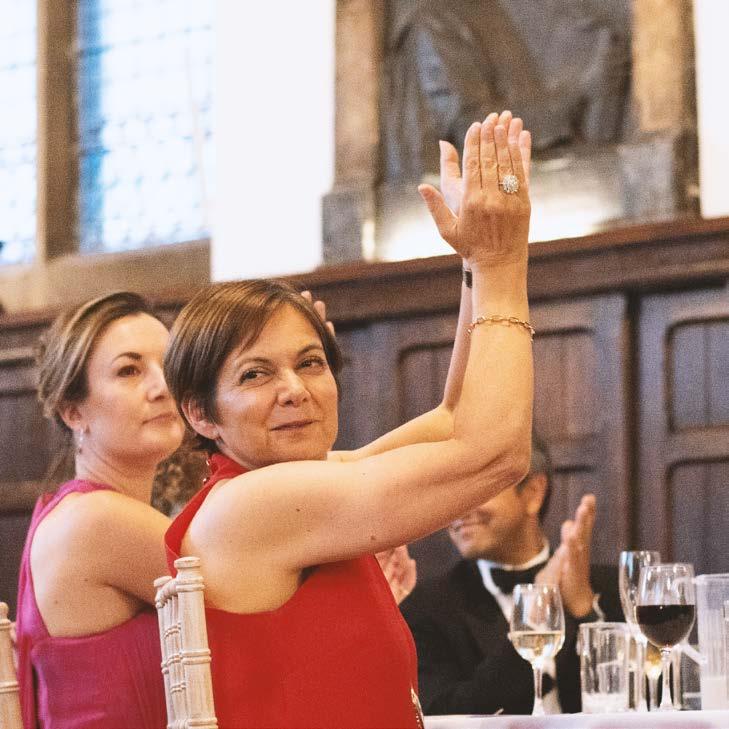
Kate regularly blogs as well as contributing articles for leading HR publications including Employers’ Law and Personnel Today and is also a member of the Employment Lawyers Association.
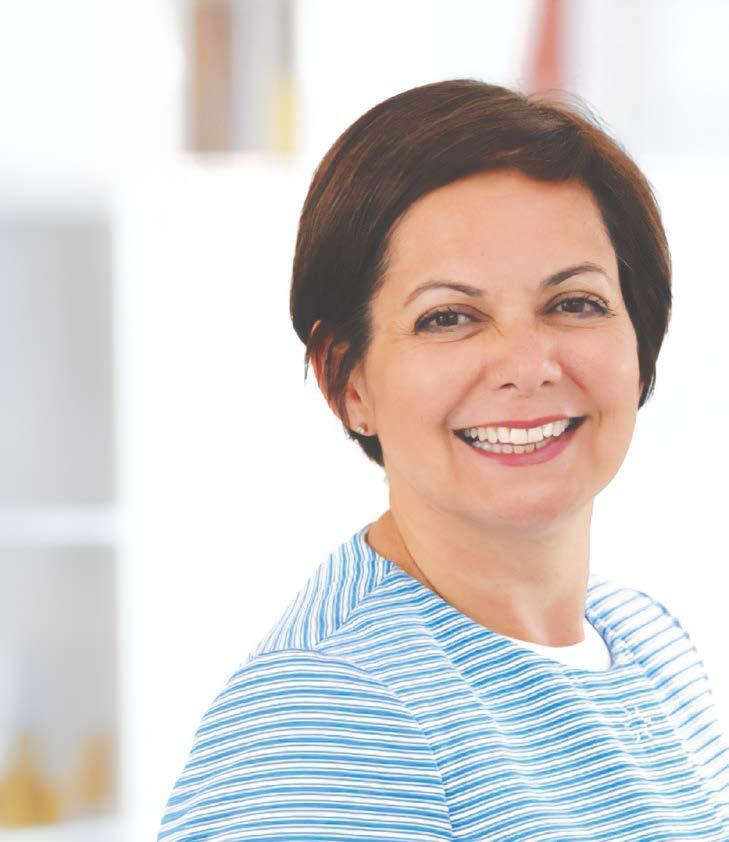
What are your best memories of BGS?
I joined BGS in Sixth Form with my year group being the last year only to become mixed in the 6th form. Having been a boarder at an all girls school in Edinburgh, BGS was, shall we say, a little different! My overriding memory is how much fun I had. That’s not to say I didn’t take my work seriously (in case my mother is reading this) but I was surrounded by bright, witty and entertaining people and we whiled away many an hour in the JCR laughing ’til our sides ached.
Saturday morning school (mainly watching films), the snack bar in the corner of the JCR and nights out at Mistys and Vadims also spring to mind (if you know, you know). The library also bowled me over – I remember when I walked in for the first time thinking it was bigger and better stocked than many a public library – it was there I discovered Virago books – a lifelong love.
And it was at BGS that I first became Kate – until then I had always gone by my full name of Catherine but within in a week or so of arriving I was told by one of the boys that ‘Catherine’ took too long to say so Kate it was and has been ever since!
Can you remember any teachers at BGS who had an impact on you?
My favourite teacher was Mr Ham – he taught us French and wasn’t averse to the odd sarcastic aside. We all thought it hilarious to call him Monsieur Jambon – time and time again – not annoying at all. There were definitely some teachers I was less keen on – but we’ll gloss over them!
Mr Avery was headmaster at the time – such a calm and dignified man – he really set the tone of the school and I was pleased to be able to attend his recent funeral and hear all the wonderful tributes about him.
Why did you choose law?
I wish I had a brilliant story to tell for this one about how I was inspired by a stellar human rights lawyer or a desire to right some terrible miscarriage of justice. However the truth is that I knew I didn’t want to take any of my A level subjects to degree level and I was left with law as the only available option! As luck would have it, it’s turned out ok.
Could you have chosen another path and what might that have been?
I remember at one point wanting to be a theatre or film director – having been inspired by the house drama competition perhaps? It was a real treat to meet OB Lucy Raffety recently who worked as series producer on Casualty. She very kindly let me hold her BAFTA which is the closest I will ever get to one!
What has been the most significant highlight of your career?
As an employment lawyer, the pandemic had huge implications. Our clients needed urgent advice on totally unchartered issues such as the furlough scheme, lockdown and working from home and issues around vaccines. Our team worked tremendously hard to support our clients throughout it all so I was proud as punch when we were awarded ‘Employment Law Firm of the Year’ by HR publication Personnel Today for our efforts in supporting our clients through COVID.
What is the best thing about working and living in Bristol?
Bristol is a great city – I love its vibrancy and its laid back vibe and it has some really great restaurants as well.
What motivates you?
I’m really lucky – I really enjoy my job (I honestly love employment law) and, although it may sound clichéd, I really do work in a fantastic, funny, supportive team. We have each other’s back and we want to do our jobs really well. That’s a great environment to work in.
How do you relax?
Nothing particularly out of the ordinary here – I love reading and going out with family and friends. Although I wouldn’t necessarily say it was relaxing I do quite like going for a run – which would definitely surprise anyone I was at school with – one of my favourite things about BGS was that I didn’t ever need to do any sport!
What advice would you give to your younger self?
Ah there’s so much but probably ‘don’t worry so much about what other people think – they will be far too focussed on themselves to be giving you a second thought.’
Consultant Plastic Surgeon, Mr Ali-Khan has over 24 years’ plastic surgery experience. Having completed his training in Bristol and the South West he embarked on specialist fellowship training in London (aesthetic surgery), Cambridge (reconstructive microsurgery) and Sydney (skin cancer) making him one of the few UK surgeons to have trained at the world-famous Melanoma Institute Australia. He recently opened his new business LASE, with his wife Lisa, offering the very latest plastic and cosmetic surgery procedures in Newcastle.
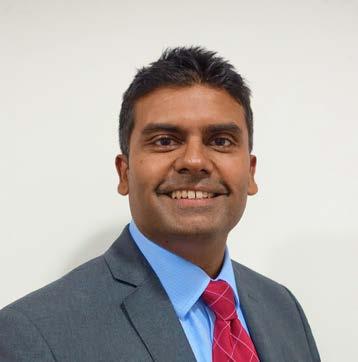
What are your best memories of BGS?
There are lots as I was lucky to be surrounded by amazing people in my year at school, both before GCSEs and in 6th Form. A favourite memory though has to be seeing Dr Ransome’s face in my GCSE French Oral exam. I was trying to tell him how we had travelled to our family holiday the previous year but couldn’t remember how to say ‘by plane’ so in the heat of the moment I opted for ‘we swam’ – in correct French. He did a double take, as the journey was over 6,000 miles! He asked me how long the swim had taken. I figured I was committed to the story so with a big smile I replied in French, ‘about 6 months!’. I passed and have never forgotten ‘par avion’ since!
Can you remember any teachers at BGS who had an impact on you?
They still do! Mr Rolling and Mr Jakobek remain in touch with me (and many others), were it not for Mr Matthews I would have probably failed GCSE maths and Mr Miller never gave up on me in Latin. I remember the teachers at BGS being very supportive and that’s not something I fully appreciated until I was older.
Tell us about your business and why plastic surgery?
I went to medical school thinking I wanted to be a family GP, like my father. I realised pretty quickly that surgery was more me and I happened to have a plastic surgery placement on my training rotation as a junior doctor in Bristol. I was hooked as soon as I started.
Could you have chosen another path and what might that have been?
I was set on medicine at quite a young age and have never regretted it. If I had to do something different, I would like to have been somehow involved in motorsport which is my big passion. I don’t have the talent to be a driver but being part of a motorsport team would be awesome.
What has been the most significant highlight of your career?
Plastic surgery differs greatly between the NHS (mostly reconstructive surgery) and the private sector (mostly cosmetic surgery) but both can have enormously positive impacts on patients and their lives. I never tire of happy patients.
What is the best thing about working in the North East?
A friend of mine worked in Durham and I took a job as a locum consultant after completing my junior doctor training, while I considered consultant posts. My family and I liked it so much we never left! The people are fabulous, there is a genuine friendliness to the north east that can take you by surprise and the beaches are beautiful, which was another big eye-opener to me. I love being up here.
Simon Turner
Ob 1987
Simon is the founder and CEO of Inflexion, a leading private equity firm, which invests in established high growth businesses for a minority or majority stake. He has 30 years’ experience of developing and leading buyouts for growth businesses, having started his private equity career in the early 1990s.
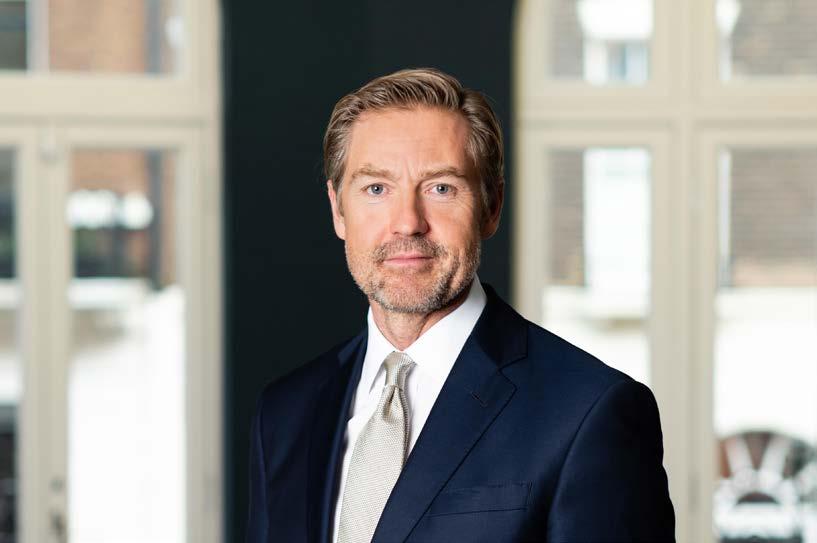
What’s next for you?
My main focus for the next few years will be on making my new private surgical facility in Newcastle, LASE, a success. The pandemic and cost of living crisis have made the business environment pretty exciting but we are still here and loving the challenge.
What motivates you?
There are many different things but ultimately I enjoy a challenge and am stubborn, in combination they are probably at the heart of what drives me.
What advice would you give to your younger self?
Trust your instincts and always find time for yourself.
Simon and his Managing Partner, John Hartz, co-founded Daiwa Europe’s Private Equity Group, which they ultimately spun out to form Inflexion. When not working, Simon leads his company’s involvement in The Prince’s Trust, is a trustee of Impetus – The Private Equity Foundation, and chair of The Roundhouse. He has skied to both the North and South Pole as part of the Antarctic Enterprise, raising over one million pounds for charity. Simon is also one of our leadership donors in the BGS 500 Campaign and his contribution is currently supporting 4 Ukrainian refugees through their education at BGS.
You attended BGS at Sixth Form, what are your best memories?
I have so many. Some of them are incredibly personal. Friendships, deep connections. But also, the diversity of experiences, lots of sport, the debating society, plays, tiny class sizes with inspiring teachers who treated you like an adult, which as a consequence inspires you yet further.
What did BGS give you?
BGS was pivotal for me. Coming into a dynamic sixth form environment, I was hugely aware of a different atmosphere and set of possibilities. Fortunately, I was just sentient enough to sense the opportunity to develop and perform, and the school helped me grab that opportunity!
Can you remember any teachers who had an impact on you?
So many! And they shared several common attributes – they were all original and unique. They were all respectful and engaged. They universally inspired but also made you want to strive harder.
What did you do after school?
Well obviously, there were the temptations of a big city, especially beguiling to the newly arrived…! But I really got stuck into all sorts – debates, plays, lots of sport.
What have been the highlights of building your business?
Building Inflexion over, ahem, 20 plus years has been huge fun. The entrepreneurial journey is a really rewarding one, and simple in a sense – you succeed or fail largely due to your own efforts. I’ve always appreciated that simplicity. The challenges and the pleasures change – at this stage it’s very much about the people, the stimulus of bright, hard charging teams, and the challenge of evolving to meet their needs and a fast-moving world.
What’s next for the company?
There’s always much to do! But big priorities for us include continuing to build our international presence, as well as leading the industry’s approach to ESG.
How important is philanthropy to you and your business?
Very. We created a sizable Foundation some years ago which supports an array of terrific charity partners. This is largely focused on young people, but also has a growing environmental focus. The whole organisation really gets involved in helping with decision making, but also working with some of the charities as fundraisers, trustees, coaches and more. It’s super rewarding, but also a cornerstone of the Inflexion culture.
What motivates you?
We live at an extraordinary time, in an extraordinary world. I love the sense of possibility that brings. There are of course many challenges and many blockers, but in a sense, far fewer than at any other time in human history. That’s terrifically exciting. But I’m also fired up about being able to play a small part working on removing some of the blockers for others. That’s a privilege.
How do you relax?
Ah – with great ease! But often in the wild places. I love to get off the grid, I’m sailing a lot at the moment, but also the simple things – a good book!
What advice would you give to your younger self?
Oh, there’s a long ignoble list of errors and omissions and plenty of embarrassment over the years. But I’d probably not avoid most of them – with hindsight! My advice would be – Don’t be frightened, grab your moments, jump in. It works out… generally!










